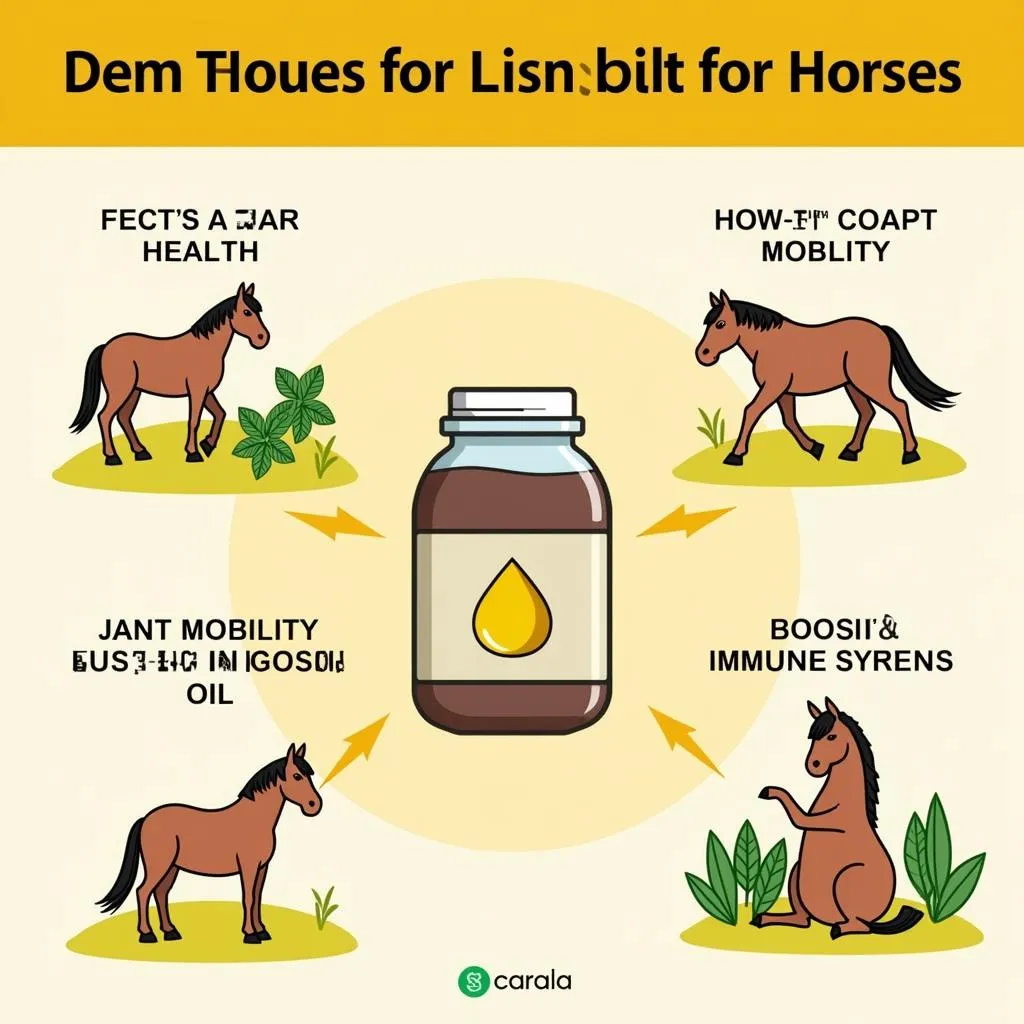Canola oil, a versatile and healthy option for humans, is increasingly becoming a popular supplement for horses. However, it’s crucial to understand the proper dosage and potential benefits before incorporating it into your horse’s diet. This guide will provide comprehensive information on how much canola oil is safe for horses, its benefits, and potential risks.
Understanding the Benefits of Canola Oil for Horses
Canola oil is a rich source of essential fatty acids, particularly omega-3 and omega-6, which play a crucial role in maintaining your horse’s overall health. These fatty acids contribute to:
- Improved Coat Health: Canola oil promotes a shiny, healthy coat by providing essential nutrients for hair growth and skin health.
- Enhanced Immune System: The omega-3 fatty acids in canola oil have anti-inflammatory properties that can strengthen the immune system and combat inflammation.
- Improved Joint Health: Canola oil can help reduce joint inflammation and improve mobility in horses, particularly those with arthritis or other joint conditions.
- Enhanced Digestive Health: Canola oil aids digestion by improving the flow of food through the digestive tract.
Determining the Right Dosage of Canola Oil for Horses
The amount of canola oil you should give your horse depends on several factors, including:
- Horse’s Weight: Larger horses typically require a higher dosage of canola oil compared to smaller horses.
- Health Condition: Horses with specific conditions like arthritis may need a higher dose than healthy horses.
- Dietary Needs: If your horse has a deficiency in essential fatty acids, you may need to increase the dosage of canola oil.
- Horse’s Tolerance: Start with a small dose and gradually increase it until you observe the desired effects.
“It’s important to note that every horse is different and may respond to canola oil differently,” says Dr. Emily Carter, a renowned equine veterinarian.
Recommended Dosage Guidelines
As a general rule, start with 1-2 tablespoons of canola oil per day for an average-sized horse, and gradually increase the dosage by 1 tablespoon per week until you see the desired results.
Important Considerations:
- Introduce Canola Oil Gradually: To prevent digestive upset, start with small amounts and gradually increase the dose over several weeks.
- Mix with Feed: To ensure proper consumption, mix canola oil with your horse’s feed.
- Monitor for Side Effects: Watch for any signs of digestive upset, such as diarrhea or colic. If you notice any side effects, discontinue use and consult with your veterinarian.
- Vet Consultation is Key: Always consult with your veterinarian before adding any supplements, including canola oil, to your horse’s diet.
Potential Risks of Canola Oil for Horses
While canola oil offers numerous benefits, it’s important to be aware of potential risks:
- Digestive Upset: Excessive consumption of canola oil can lead to digestive upset, including diarrhea and colic.
- Obesity: Overfeeding canola oil, particularly in horses prone to weight gain, can contribute to obesity.
- Allergic Reactions: While rare, horses can have allergic reactions to canola oil. If you notice any signs of an allergic reaction, discontinue use and contact your veterinarian immediately.
Frequently Asked Questions about Canola Oil for Horses
1. Can I give my horse canola oil every day?
- Yes, you can give your horse canola oil every day as long as it’s part of a balanced diet and you are not overfeeding.
2. What type of canola oil should I use for my horse?
- It’s best to use cold-pressed, unrefined canola oil for horses as it retains its natural nutrients and benefits.
3. How long does it take to see the benefits of canola oil for horses?
- You may start seeing improvements in your horse’s coat and overall health within a few weeks of starting canola oil supplementation.
4. Can I give canola oil to a pregnant or lactating mare?
- It’s generally safe to give canola oil to pregnant or lactating mares, but always consult with your veterinarian first.
5. How much canola oil can I give my foal?
- Foals require less canola oil than adult horses. Start with a small dose and gradually increase it based on the foal’s weight and veterinarian’s advice.
Conclusion
Canola oil can be a valuable supplement for your horse, promoting improved coat health, joint health, and immune function. However, remember to start with a small dose, gradually increase it, and consult with your veterinarian to determine the appropriate dosage for your horse. With careful monitoring and expert guidance, you can effectively use canola oil to support your horse’s overall well-being.
 Canola oil for horses: benefits for coat, joints, and more
Canola oil for horses: benefits for coat, joints, and more
Remember, always consult with your veterinarian before making any changes to your horse’s diet.
For any further questions or concerns, please contact us at 0772127271, [email protected] or visit our location at QGM2+WX2, Vị Trung, Vị Thuỷ, Hậu Giang, Việt Nam. Our customer service team is available 24/7.